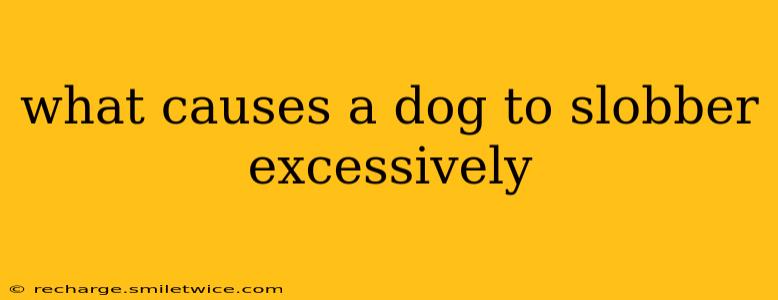Excessive drooling, or ptyalism, in dogs is a common problem that can stem from various causes, ranging from benign to serious medical conditions. Understanding the underlying reasons is crucial for providing your canine companion with the appropriate care. This comprehensive guide explores the multifaceted reasons behind excessive drooling in dogs, helping you identify potential issues and when to seek veterinary attention.
Why Does My Dog Drool So Much?
Many factors contribute to excessive drooling in dogs. It's not always a cause for immediate alarm, but persistent or sudden excessive drooling warrants a visit to your veterinarian.
1. Breed Predisposition:
Certain breeds are naturally predisposed to drooling more than others. Brachycephalic breeds, like Bulldogs, Pugs, and Shih Tzus, often drool due to their short snouts and nasal passages, making it difficult for them to properly drain saliva. Other breeds known for drooling include Saint Bernards, Mastiffs, and Bloodhounds. This is often a normal occurrence for these breeds.
2. Excitement or Anticipation:
Just like humans might get nervous sweats, dogs can excessively drool when excited or anticipating something pleasurable, such as a walk, mealtime, or the arrival of a favorite person. This is usually temporary and considered normal.
3. Nausea or Stomach Upset:
If your dog is feeling nauseous or experiencing an upset stomach, excessive drooling can be a symptom. This is often accompanied by other signs like vomiting, diarrhea, loss of appetite, and lethargy. In these cases, veterinary attention is recommended.
4. Oral Issues:
Problems within the mouth, such as dental disease (gingivitis, periodontal disease), mouth sores, tumors, or foreign objects lodged in the mouth, can all cause increased salivation. Regular dental check-ups are crucial for preventing these issues.
5. Neurological Conditions:
Certain neurological conditions, like stroke, seizures, or brain tumors, can affect the nervous system's control over salivation, leading to excessive drooling. This is often accompanied by other neurological symptoms, such as changes in behavior, coordination problems, and weakness.
6. Medication Side Effects:
Some medications can have excessive drooling as a side effect. If you've recently started your dog on a new medication and notice increased drooling, consult your veterinarian.
7. Poisoning:
Exposure to certain toxins or poisons can also trigger excessive drooling. This is often accompanied by other symptoms such as vomiting, diarrhea, tremors, and difficulty breathing. Immediate veterinary attention is critical in cases of suspected poisoning.
8. Heatstroke:
In hot weather, heatstroke can lead to excessive drooling, along with other signs like panting, rapid heartbeat, and weakness. Heatstroke is a life-threatening condition, requiring immediate veterinary care.
9. Foreign Body in the Esophagus or Stomach:
A foreign body lodged in the esophagus or stomach can stimulate excessive salivation as the dog attempts to dislodge the object. Other symptoms may include gagging, vomiting, and loss of appetite. Veterinary intervention is necessary to remove the obstruction.
When Should I Worry About My Dog's Drooling?
While some drooling is normal, especially in certain breeds, you should consult your veterinarian if:
- The drooling is sudden and excessive.
- It's accompanied by other symptoms, such as vomiting, diarrhea, lethargy, or neurological signs.
- Your dog's behavior changes significantly.
- The drooling persists for an extended period.
Regular veterinary check-ups are essential for early detection and prevention of underlying medical conditions that might cause excessive drooling. Your veterinarian can conduct a thorough examination and recommend appropriate treatment based on the underlying cause. Remember, early intervention is key to ensuring your dog's health and well-being.
